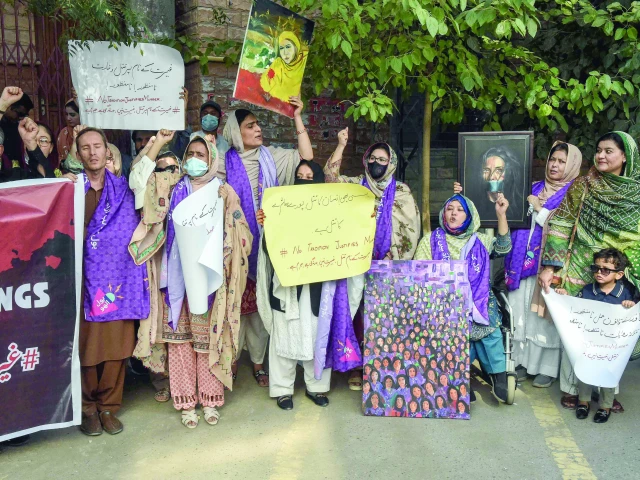Sheetal and Zarak were murdered in the name of “honour.” But this wasn’t an isolated act of violence. It was part of a system—rehearsed, repeated, and reinforced—where control over women’s lives is masked as tradition, culture, or faith. Some cases make headlines. A few become hashtags. Most vanish—into silence, into unmarked graves, into the forgotten margins of a society that punishes women simply for wanting to lead a life of their choice.
Honour killings are just the visible tip of a deeper structure. For every woman whose life is taken, thousands more are forced to live lives they never chose—lives scripted by men around them. From the moment a girl dreams—of studying, working, choosing her friends or her partner—her ambitions are clipped, reshaped, or erased to fit the limits drawn by others.
In Pakistan, particularly within rural and low-income communities, nearly 40% of girls are married off before they reach the age of 20. These young girls—still navigating childhood—often have little understanding of what they are being thrust into. Many are married to men much older than them, with the union framed as duty, obedience, or family honour. They are quickly reduced to childbearing machines and domestic slaves for the extended in-law family.
Emotional neglect, coercion, and physical and psychological abuse become normalized—not because these girls accept it, but because they lack the awareness, agency, or support to question it.
Sheetal tried to challenge it. She tried to step out of the system that had enslaved her. But like so many women, she found no real exit—only walls disguised as windows.
Divorce vs Khula
Women in Pakistan face systematic discrimination on all fronts. In Pakistan, the process of ending a marriage is a stark reflection of the gender imbalance embedded in both society and law.
For men, divorce (talaq) is a right—simple, inexpensive, and procedurally smooth. For women, seeking freedom through khula is an uphill battle—legally, financially, and emotionally punishing.
A man can divorce his wife simply by pronouncing talaq, verbally or in writing, and sending a notice to the local Union Council. The council is then required to initiate a 90-day reconciliation process, after which the divorce is automatically finalized if no compromise is reached. There is no need for him to justify the separation. He is not required to appear in court, present evidence, or face scrutiny. The entire process may cost him only a few hundred rupees in administrative paperwork and concludes in roughly three months.
Now contrast this with khula, the only legal exit available to women under Islamic law. A woman must file a case in the Family Court, cite valid grounds for separation—such as cruelty, neglect, or incompatibility—and formally petition a judge to grant her release. The court issues summons to the husband, attempts reconciliation, and only then proceeds with hearings. Even though Islamic law does not require a woman to prove abuse to seek khula, judges—mostly male—often expect it. Her testimony alone is frequently questioned, and her suffering weighed against cultural expectations of endurance and obedience.
Beyond legal hurdles, the financial disparity is equally crushing. While a man’s divorce might cost less than a thousand rupees, a woman seeking khula must pay anywhere between Rs20,000 to Rs100,000 or more. Legal representation is often essential, and most women—especially from rural or low-income backgrounds—can neither afford a lawyer nor navigate the court system on their own. Transport costs, repeated court visits, documentation, and lost time only add to the burden. And often, as a condition of release, the woman is forced to forfeit her mehr—the financial security promised to her at the time of marriage. Ironically, this is money she may have never even seen, let alone controlled.
While a man’s divorce is finalized after the 90-day reconciliation period, a khula case can drag on for six months, a year, or longer—especially if the husband refuses to cooperate or attempts to delay proceedings. In that time, the woman may be exposed to threats, emotional blackmail, financial starvation, and even physical violence.
The Illusion of Access
So ask yourself: How is a woman, often denied education, banned from leaving home, and never allowed to handle money, supposed to navigate this process? How does she reach a courthouse when she’s never taken a bus alone? How does she hire a lawyer when she doesn’t even have a phone?
In theory, khula exists. In reality, it is accessible only to the privileged—urban, educated, financially independent women. Even for them, it is exhausting and dehumanizing. For women trapped behind purdah, cut off from support, forbidden to speak to strangers, and wholly dependent on male relatives, khula is not difficult—it’s unthinkable.
Like Sheetal, women who dare to dream know that the only option they have is to run away and face death or spend their entire life imprisoned and enslaved in a barbaric system.
A System That Hunts the Vulnerable
And that’s why honour killings persist. When women can’t leave safely, they run. And when they run, they’re hunted. There are no widespread legal aid programs. No helplines. No outreach. In areas where women are most vulnerable, legal literacy is almost zero. Khula is not a right—it’s a fantasy.
Sheetal didn’t die because she broke the law. She died because she tried to survive it. Her story forces us to confront a brutal truth:
How can a woman exercise her legal rights when she has no money, no mobility, no education, and no protection?
Until we answer that—not with speeches, but with systems—women like Sheetal will keep being punished.
Not for defiance.
But for daring to live.


COMMENTS
Comments are moderated and generally will be posted if they are on-topic and not abusive.
For more information, please see our Comments FAQ